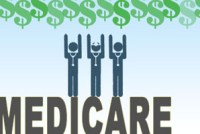Latest KFF Health News Stories
In Study, Questions About Who Should Perform In-Office Surgeries
A study of Medicare billing found that many dermatology procedures were done by nurse practitioners and physician assistants.
Letters to the Editor is a regular feature in which readers comment on KHN original stories.
Government Streamlining Medicare Coverage For Cancer Test
FDA and Medicare officials conduct a parallel review of a new screening test for colorectal cancer and that could bring the test to beneficiaries six months faster.
HHS Report Finds Medicare Advantage Plans Exaggerate Members’ Diseases To Make More Money
The study urges changes in federal policies that allow higher payments for sicker patients.
Expert Panel Recommends Sweeping Changes To Doctor Training System
Overhauling financing is seen as key to reforms.
Medicare Experiment Could Signal Sea Change For Hospice
What happens when hospice patients can keep getting life-extending treatment? Palliative care expert Diane Meier discusses the new program.
Good News For Boomers: Medicare’s Hospital Trust Fund Appears Flush Until 2030
But the fund that pays disability benefits needs help fast.
Medicare Testing Payment Options That Could End Observation Care Penalties
The pilot projects underway at hospitals eliminate the requirement that seniors must be admitted for three days before they qualify for nursing home coverage.
Readers Ask About Contraceptive Coverage And Medicare Enrollment
Kaiser Health News’ consumer columnist Michelle Andrews answers these questions.
Study: Hospitals Using Electronic Medical Records Not Bilking Medicare
In 2012, Medicare was rocked by allegations hospitals were systematically overcharging the government program by misusing electronic medical records. A study published Tuesday disputes that.
More Than 750 Hospitals Face Medicare Crackdown On Patient Injuries
The 1 percent cut in payments is the latest effort by the federal government to improve hospital care.
Patient Injuries: Hospitals Most Likely To Be Penalized By Medicare
Out of all 761 hospitals that are in line to be penalized for high rates of infections and complications this fall, 175 of them are most likely to be penalized because their preliminary scores are nine or above on a scale of 1 to 10.
Readers Ask: Are Insurance Premiums Capped? Do Doctors Have To Accept Medicare?
KHN’s consumer columnist answers inquiries from readers.
How To Shop For Long-Term Care Insurance
One of the toughest money decisions Americans face as they age is whether to buy long-term care insurance.
Some Colorado Doctors May Be Overcharging Medicare For Routine Visits
An analysis of newly available data may reveal fraud. But experts caution that the raw data alone could also make physicians who are doing nothing wrong look bad.
Should Medicare Pay The Same No Matter Where The Patient Gets Care?
That question was the focus of a House subcommittee hearing Wednesday, and it’s an important issue in the context of the debate over ending the Medicare SGR. Mary Agnes Carey and CQ HealthBeat’s John Reichard discuss.
California Doctors Among Those Charging Medicare The Most For Office Visits
Billing data show that some doctors charge the government much more than their peers in the same specialty by deeming almost all office visits “complex.”
Medicare May Be Overpaying Hospitals For Short-Stay Patients
A congressional panel has held its first hearing on a controversial rule that governs the admission status of Medicare patients.
Medicare Struggling With Hepatitis-C Cure Costs
Millions of baby boomers have hepatitis-C, and as they age into Medicare, the problem is how to pay for a $100,000+ treatment.
Hospitals Boost Patient Safety, But More Work Is Needed
Readmissions and patient injuries decrease as new government programs take effect.























